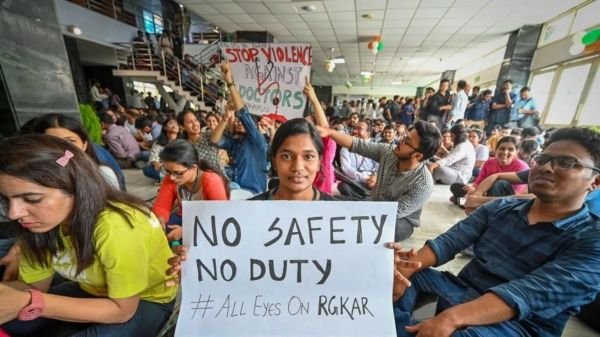An alleged rape and murder of a female doctor at a Kolkata Hospital has resulted in mass protests by doctors in India.
The female doctor was allegedly murdered in a government hospital, according to multiple reports.
On Friday morning, according to reports, a 31-year-old female trainee doctor at Kolkata hospital retired to sleep in a seminar hall after a gruelling day at one of India’s oldest hospitals.
Reports say it was the last time she was seen alive.
The next morning, her colleagues discovered her half-naked body on the podium, bearing extensive injuries. Police later arrested a hospital volunteer worker with Kolkata hospital in connection with what they say is a case of rape and murder at Kolkata’s 138-year-old RG Kar Medical College, reports the BBC.
Tens of thousands of women in Kolkata and across West Bengal state are expected to participate in a ‘Reclaim the Night’ march at midnight on Wednesday, demanding the “independence to live in freedom and without fear”.
The march takes place just before India’s Independence Day on Thursday. Outraged doctors have struck work both in the city and across India, demanding a strict federal law to protect them.
The tragic incident at Kolkata hospital has again cast a spotlight on the violence against doctors and nurses in the country.
Reports of doctors, regardless of gender, being assaulted by patients and their relatives have gained widespread attention.
Women – who make up nearly 30% of India’s doctors and 80% of the nursing staff – are more vulnerable than their male colleagues.
The crime in the Kolkata hospital last week exposed the alarming security risks faced by the medical staff in many of India’s state-run health facilities.
The incident happened in the 138-year-old RG Kar Medical College, one of the oldest in India
At RG Kar Hospital, which sees over 3,500 patients daily, the overworked trainee doctors – some working up to 36 hours straight – had no designated rest rooms, forcing them to seek rest in a third-floor seminar room.
Reports indicate that the arrested suspect, a volunteer worker with a troubled past, had unrestricted access to the ward and was captured on CCTV. Police allege that no background checks were conducted on the volunteer.
“The hospital has always been our first home; we only go home to rest. We never imagined it could be this unsafe. Now, after this incident, we’re terrified,” says Madhuparna Nandi, a junior doctor at Kolkata’s 76-year-old National Medical College.
Dr Nandi’s own journey highlights how female doctors in India’s government hospitals have become resigned to working in conditions that compromise their security.
Dr Madhuparna Nandi says there are no designated rest rooms and toilets for female doctors at her hospital
At her hospital, where she is a resident in gynaecology and obstetrics, there are no designated rest rooms and separate toilets for female doctors.
“I use the patients’ or the nurses’ toilets if they allow me. When I work late, I sometimes sleep in an empty patient bed in the ward or in a cramped waiting room with a bed and basin,” Dr Nandi told me.
She says she feels insecure even in the room where she rests after 24-hour shifts that start with outpatient duty and continue through ward rounds and maternity rooms.
One night in 2021, during the peak of the Covid pandemic, some men barged into her room and woke her by touching her, demanding, “Get up, get up. See our patient.”
“I was completely shaken by the incident. But we never imagined it would come to a point where a doctor could be raped and murdered in the hospital,” Dr Nandi says.
Some 30% of doctors in India are women, according to one estimate.
What happened on Friday was not an isolated incident. The most shocking case remains that of Aruna Shanbaug, a nurse at a prominent Mumbai hospital, who was left in a persistent vegetative state after being raped and strangled by a ward attendant in 1973. She died in 2015, after 42 years of severe brain damage and paralysis. More recently, in Kerala, Vandana Das, a 23-year-old medical intern, was fatally stabbed with surgical scissors by a drunken patient last year.
In overcrowded government hospitals with unrestricted access, doctors often face mob fury from patients’ relatives after a death or over demands for immediate treatment.
Kamna Kakkar, an anaesthetist, remembers a harrowing incident during a night shift in an intensive care unit (ICU) during the pandemic in 2021 at her hospital in Haryana in northern India.
“I was the lone doctor in the ICU when three men, flaunting a politician’s name, forced their way in, demanding a much in-demand controlled drug. I gave in to protect myself, knowing the safety of my patients was at stake,” Dr Kakkar told me.
Namrata Mitra, a Kolkata-based pathologist who studied at the RG Kar Medical College, says her doctor father would often accompany her to work because she felt unsafe.








